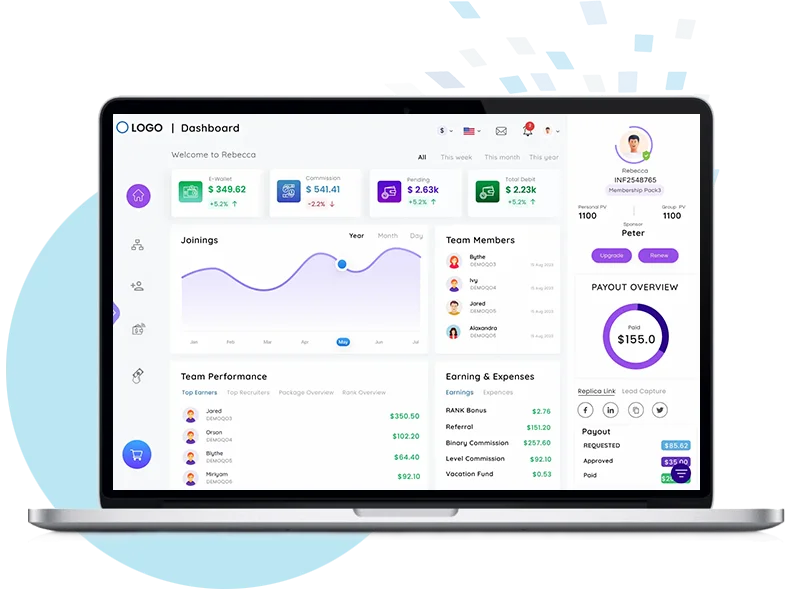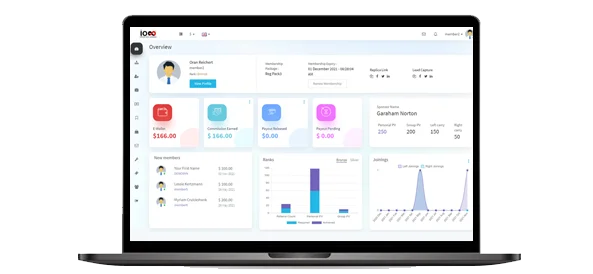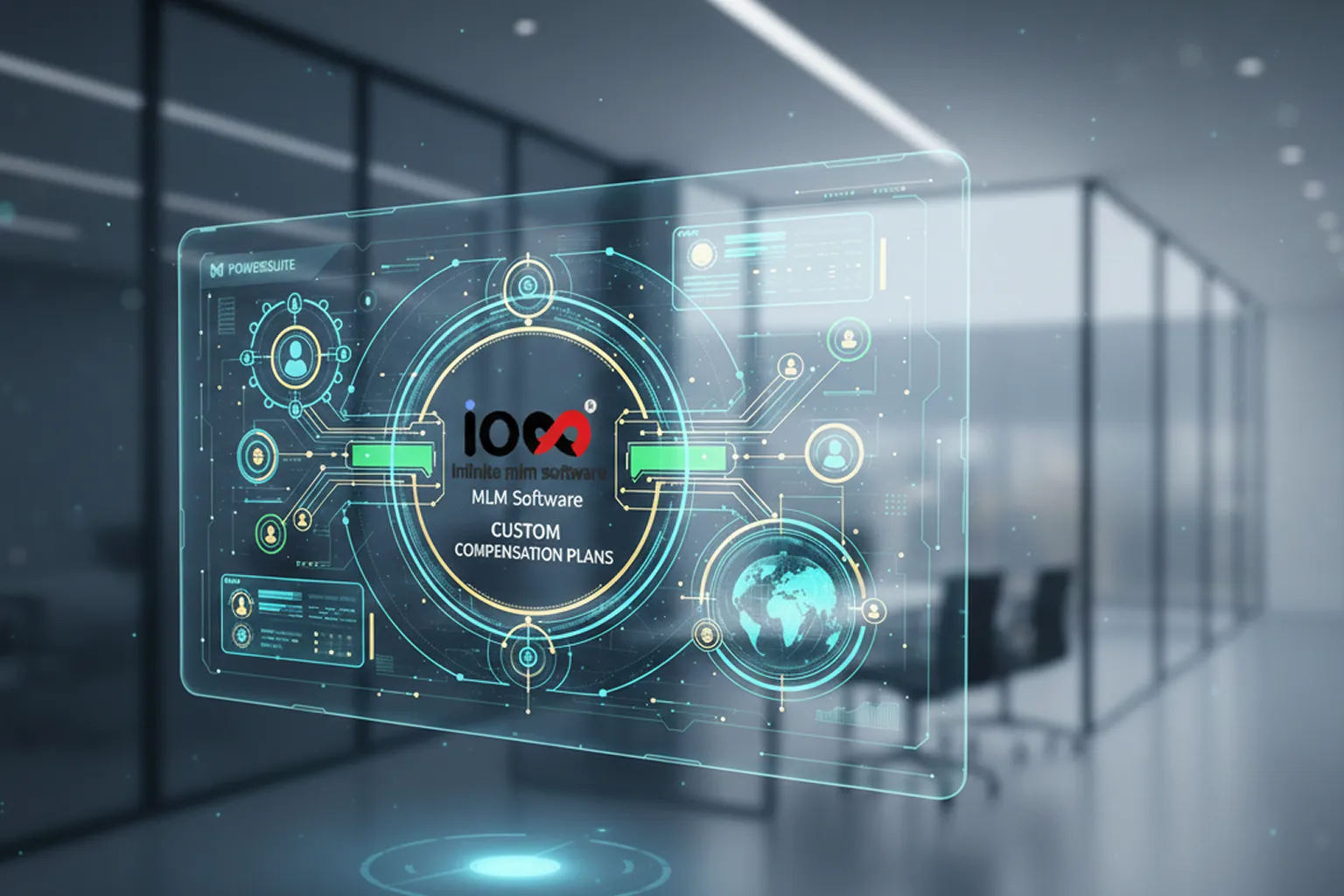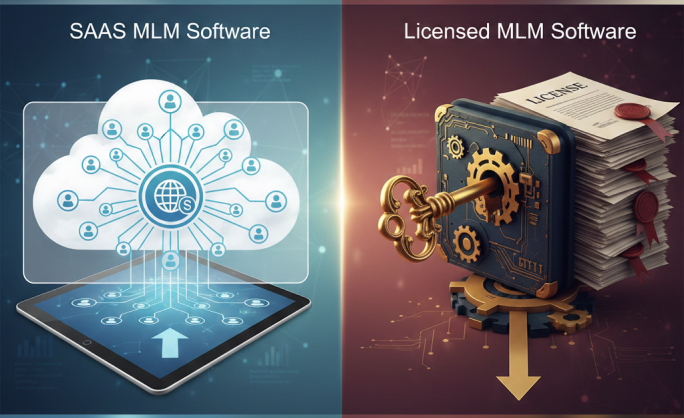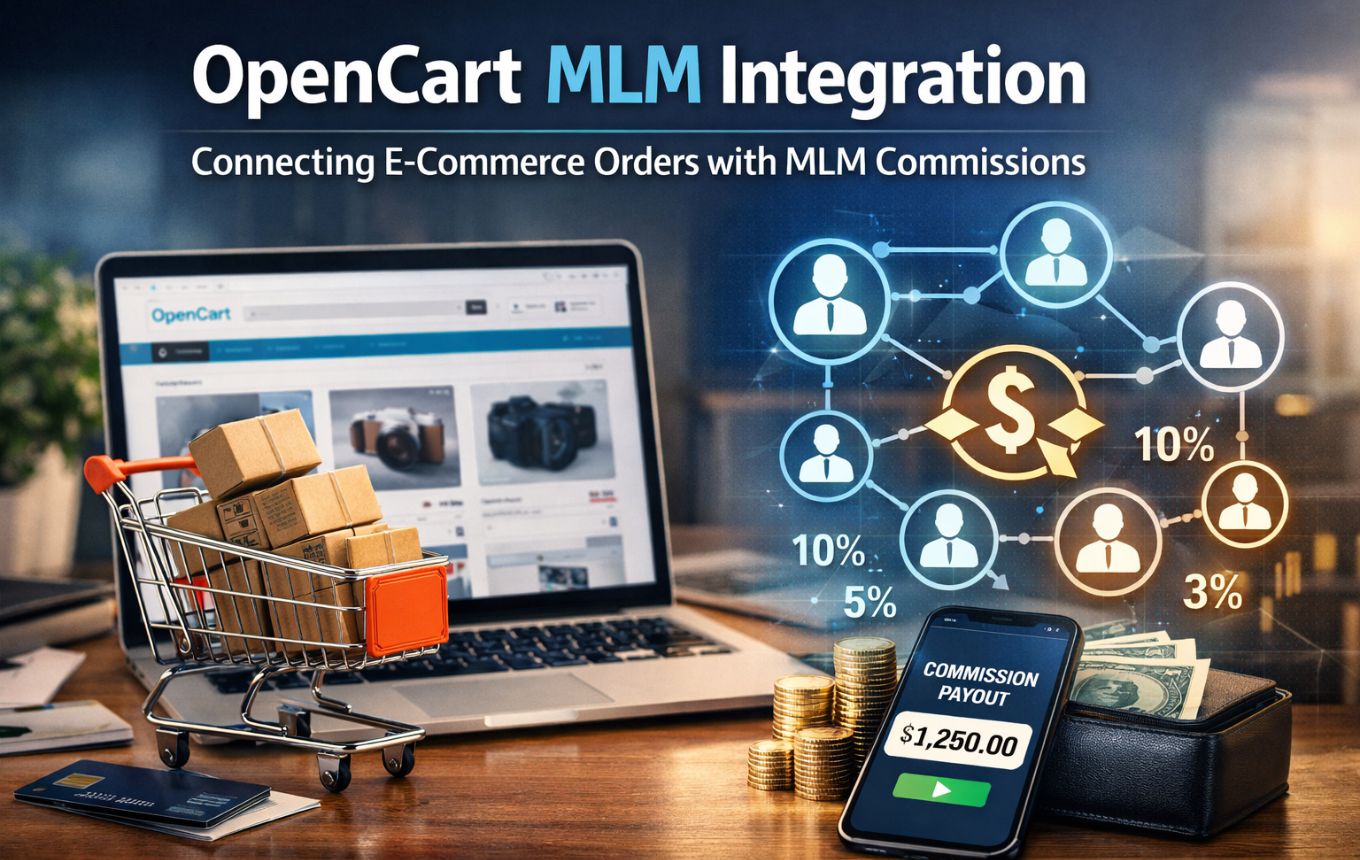Traditionally separate, MLM and franchising can be combined, turning out to be a highly lucrative business model.
At its core, MLM is a strategy many direct sales companies use to encourage existing distributors to recruit new distributors by paying the existing distributors a percentage of their recruits’ sales. Franchising, on the other hand, is a business (the franchisor) granting a license to individuals or entities (the franchisees) to operate a business using the franchisor’s brand, systems, and support.
Now, imagine merging these two powerful models. In this unique MLM franchise framework, a distributor in an MLM company steps into the role of a franchisee. Seems interesting right?
Our focus in this blog is the pivotal role of MLM software in this amalgamation. We will explore how this software not only facilitates efficient management but also enhances the growth potential of an MLM franchise.
Let’s dive in!
What Do You Mean By MLM Franchising?

In recent years, the term “MLM franchise” has been buzzing in the business world, signifying a groundbreaking model that merges two distinct yet complementary business strategies: Multi-Level Marketing (MLM) and franchising. This innovative approach is redefining how MLM businesses operate and expand, but what exactly does it entail?
What is MLM Franchising?
At its essence, MLM franchising is a hybrid model where the principles of MLM and franchising converge. Typically, in a MLM structure, distributors earn commissions not only from their direct sales but also from the sales made by their recruited network, or downline. Here, the focus is primarily on building a network and selling products or services.
In contrast, franchising involves acquiring the rights to operate a business under an established brand’s banner, following specific guidelines and systems set forth by the franchisor. It’s about replicating a successful business model in different locations.
MLM franchising brings these concepts together. In this model, a distributor in an MLM company transitions into a role of a franchisee. This means that they’re not just selling products or services and recruiting more distributors; they’re also adopting the business model of MLM companies.
The Role of the Distributor-turned-Franchisee

In an MLM franchise, the distributor-turned-franchisee takes on greater responsibility and enjoys a higher level of autonomy than a typical MLM distributor. They are tasked with not only promoting and selling the products but also managing a business that mirrors the larger MLM company. This includes adhering to brand guidelines, maintaining quality standards, and often overseeing a local team.
The MLM franchising model elevates distributors to business owners, allowing them to leverage a proven business model and brand recognition while maintaining the flexibility and growth potential inherent in MLM. This unique combination can result in accelerated business growth, a more substantial presence in various regions, and an enhanced overall brand image.
The growth of the MLM franchise model signifies a shift towards more sustainable and scalable business practices in the MLM sector. It’s an exciting development that promises to open up new avenues for growth and profitability, both for the direct sales companies and the individuals who embark on the journey of becoming MLM franchisees.
The Power of Franchising in MLM
Franchising within the MLM industry presents a dynamic approach to business growth and network expansion. Let’s explore the transformative impact of this model:

Enhanced Brand Image
Each franchised location, acting as a representative of the larger MLM company, maintains the brand’s identity and values. This consistent branding across various locations fosters customer trust and loyalty, as consumers encounter the same high-quality experience regardless of where they engage with the brand.

Standardized Operations
A successful MLM franchising ensures uniformity in product quality and sales practices across all franchises. By implementing a set of proven operational guidelines, franchisees can effectively replicate the business model, ensuring that customers receive the same level of service and product excellence.

Empowering Distributors
In the franchise MLM model, distributors become skilled business owners. This transformation is supported by comprehensive training and ongoing support from the franchisor. Franchisees gain extensive knowledge in areas like business management, sales techniques, and customer service, equipping them to run their franchise successfully.

Market Expansion & Saturation Control
MLM franchising excels in enabling strategic geographic expansion. The franchisor can identify and target key markets for growth, assigning franchises to these areas. With franchising, territories are clearly defined, ensuring that each franchise has ample opportunity for growth without the risk of internal competition eroding the market.

Reduced Risk
The franchise model reduces the risk typically associated with starting a new business. MLM franchisees benefit from the parent company’s proven business model, reducing the uncertainties that come with starting a business from scratch. Additionally, they gain access to established branding and marketing strategies.

Community Building and Networking
Finally, this model fosters a strong sense of community and networking. MLM franchisees often share best practices and support each other, creating a collaborative environment that benefits all participants. This network enhances business growth through shared knowledge and resources, and also strengthens individual franchisee motivation.
Challenges of Traditional MLM
The world of multi-level marketing offers significant opportunities for growth and entrepreneurship. However, it’s not without its challenges, particularly in contexts where MLM franchising or the MLM franchise model is not in play. Let’s delve into some of these challenges, underscoring how the lack of a franchising structure can impact MLM businesses.

Market Saturation
In traditional MLM models, there’s often no territorial restriction, leading to market saturation. Distributors may find themselves competing in the same geographical areas, which can significantly limit their potential for sales and recruitment. This situation can lead to decreased motivation among distributors and reduced income potential.

Brand Consistency
Without the standardized approach of MLM franchising, maintaining a consistent brand image and customer experience can be challenging. Each distributor may adopt different sales strategies and customer interaction styles, leading to a varied and sometimes inconsistent brand representation.

Quality Control
In a non-franchised MLM setup, controlling the quality of the product or service across the network can be a hassle. Since distributors are independent agents, it’s difficult to ensure they all adhere to the same quality standards and practices, unlike in a franchised environment where strict guidelines and quality checks are commonplace.

Training and Support
Adequate training and support are crucial for distributor success in MLM. However, in traditional MLM models, the level and quality of training and support provided can vary greatly. Without the comprehensive training programs typically found in an MLM franchise distributors may lack the necessary skills and knowledge to effectively grow their business.

Long-Term Business Sustainability
The traditional MLM model can face challenges in ensuring long-term business sustainability for individual distributors. The absence of a structured business model, like that in MLM franchising, means distributors must often devise their own business strategies, which may not always be successful or sustainable in the long run.
Franchising as a Solution
The integration of MLM franchising presents a compelling solution to many of the challenges traditionally faced by MLM businesses. Let’s explore how this innovative approach addresses these issues, creating a more sustainable and effective business model.
Creating a Standardized Customer Experience
With MLM franchising, inconsistency in customer experience is addressed by establishing franchise locations that adhere to a standardized set of practices and quality measures. These franchise units ensure that customers receive a uniform, high-quality experience regardless of the location.
Comprehensive Training and Support
In a franchise MLM system, franchisees receive extensive training and ongoing support from the franchisor. This training covers various aspects of business management, sales strategies, and customer service. This support system not only enhances individual performance but also strengthens the overall network.
Defined Territories to Prevent Market Saturation
Market saturation is a common pitfall in MLM models without franchising. MLM franchising addresses this by defining territories for each franchise, ensuring a balanced distribution of opportunities. This territorial planning prevents the overcrowding of distributors, allowing each franchise to grow and prosper without the constant threat of market saturation.
Leveraging Brand Reputation
Franchise MLM leverages the established brand reputation of the franchisor, which can significantly improve public perception and trust. Franchisees benefit from the positive brand image and recognition, making it easier to attract and retain customers. This association with a reputable brand is beneficial for new franchises as they build their presence in the market.
The Influence Of MLM Software On Franchising MLM Business Model
The integration of MLM software in the Franchising MLM business model is reshaping how these enterprises operate and grow. Let’s delve into how this technology is making a significant impact.

Unique Brand Identity
In MLM franchising, maintaining a cohesive and strong brand image across all franchise locations is crucial. MLM software aids in this endeavor by incorporating a centralized brand management system. This system provides access to pre-designed marketing materials, ensuring that all franchisees adhere to the brand’s visual and communicative standards. By organizing these elements, the software helps in presenting a unified brand identity to customers, irrespective of the franchise’s geographical location.

Maintain Standard Efficiency
Another pivotal aspect where MLM software excels is in standardizing operations across the franchise network. The software automates various workflows such as inventory management, sales processing, and customer interactions. This automation ensures that all franchises operate by maintaining the quality and efficiency standards set by the MLM company. MLM software minimizes inefficiencies, ensuring a smooth, uniform business process that is beneficial both for the franchisor and the franchisees.

Empowering Distributors
Transforming distributors into successful franchise owners is a significant leap, one that MLM software facilitates remarkably. Features for sales tracking, team management, and customer communication are integrated within the software, offering franchisees a comprehensive platform to manage and grow their business. These tools empower distributors to manage a business entity effectively, tracking progress, and making informed decisions.
The role of MLM software in the Franchising MLM model is multifaceted and deeply influential. As this business model continues to evolve, the reliance on sophisticated MLM software solutions will likely grow, further driving the success and scalability of MLM franchises.
Features of Franchise Management Software
Let’s explore how each feature of franchise management software contributes to the success of MLM franchising:

Inventory Management
In MLM franchising, managing inventory efficiently across various locations is crucial. Inventory management features in the software allow franchises to track stock levels, manage orders, and ensure timely stocking. This prevents stock shortages or overstocking, ensuring that each franchise has the right products available to meet customer demand.

Automation
Automation streamlines repetitive and time-consuming tasks such as order processing, customer notifications, and payment tracking. This automation in MLM increases efficiency, allowing franchisees to focus more on strategic aspects like sales and customer engagement, as well as network building.

Marketing Automation
Marketing automation tools enable franchises to conduct targeted marketing campaigns efficiently. They can schedule and automate email campaigns, social media posts, and other marketing activities. This helps in maintaining consistent communication with customers and ensures timely promotion of new products or offers.

Analytics
Analytics provide valuable insights into business performance, customer preferences, and market trends. Franchisees can use this data to make decisions about product offerings, network marketing strategies, and other business operations, leading to better performance and profitability.

Efficient Onboarding
Efficient onboarding of new franchisees is critical for rapid scaling. The software simplifies this process by providing access to training materials, operational guides, and support resources. This helps new franchisees to quickly learn and start their operations smoothly.

Mobile App
A mobile app allows franchisees and their teams to access the system on-the-go. This is particularly useful for managing operations remotely, accessing real-time data, and staying connected with the network, thereby enhancing responsiveness and flexibility.

Reporting
Reporting features in the software enable detailed tracking of sales, profits, customer engagement, and other key performance indicators (KPI). Regular reports help franchisors and franchisees to monitor progress, identify areas for improvement, and measure success against goals.

Brand Consistency
For MLM franchising, a software helps ensure that all marketing materials, messaging, and customer interactions align with the brand’s standards. This reinforces the brand identity and contributes to a cohesive customer experience. Thereby, maintaining brand consistency across various channels and franchisees.

Operations
Operational features of the software help in managing day-to-day activities more effectively. This includes scheduling, task management, communication tools, and more. Streamlined operations ensure that the franchise runs smoothly and efficiently, which is essential for long-term success.
In MLM franchising, each of these features plays a critical role in ensuring the network operates cohesively, efficiently, and profitably. By leveraging these tools, MLM franchises can enhance their operations, drive growth, and maintain a competitive edge in the market.
Conclusion
It’s clear that MLM franchising is not just a passing trend, but an approach that’s gaining significant traction in the business world. This model is progressively carving its niche, poised to become a well-established and preferred method for conducting MLM businesses.
However, it’s evident that no MLM operation can be effectively conducted without leveraging the capabilities of MLM software. This software, as we’ve seen, plays a multifaceted role, and staying ahead in this digital world means embracing the technological advancements that MLM software offers.
Remember, the future of MLM franchising is bright, and those who embrace the strength of MLM software will be the ones leading the charge.

